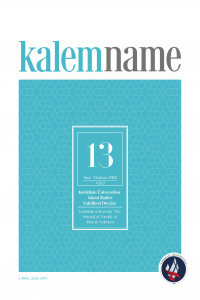HOW TO TEACH ISLAM IN A PHENOMENOLOGICAL RELIGIOUS EDUCATION APPROACH: THE CASE OF ENGLAND
Religion has emerged as a universal and deeply rooted phenomenon since the existence of mankind. In all periods of human beings’ history, religion has continued to be an inseparable attribute of human life, guiding cultures, creating a lifestyle, and sometimes caused individual or social conflicts. Religions that confront different societies each other sometimes cause very cruel consequences and that case is an important exam of the world's nations. Religions have become an element of conflict via its training, with no doubt. Today, the education of religion / religions could be an important factor threatening social peace as well as aiming to live in peace together in multicultural societies that contain differences. Religious education (RE) is part of the basic curriculum in English public schools. It is equal, in status, to the core and foundation subjects of the National Curriculum whilst remaining outside of the National Curriculum. Christianity and other principal religions, faiths, beliefs and non-religious convictions in Great Britain today are seen as an essential aspect of religious education. These major religions are Judaism, Islam, Hinduism, Sikhism and Buddhism. However, in this study, entitled by How to teach Islam in Phenomenological Religious Education Approach: The Case of England, we will focus on Islam, one of the major religions. It will be also mentioned some universal norms, such as understanding the others and respecting others, which have been able to live together with different cultures and religions in a harmonious manner and meet the demands of religious education of different religions and sects to the utmost level in the UK Religious Education System, and the Phenomenological Approach on Religious Education identified with the UK, the reasons for its arise, the development process, the UK Religious Education agreed curriculum and some sample units about teaching Islam based on this approach. It has been tried to inform how Islam is included in the Phenomenological Approach and evaluated.
Anahtar Kelimeler:
Islam, Phenomenological Approach, Religious Education, Agreed Syllabus, Understanding the others
___
- Çapcıoğlu Fatma, A study of primary education religious culture and ethics course curriculum in the context of new approaches in religious education, (Din Öğretiminde Yeni Yaklaşımlar Çerçevesinde İlköğretim Din Kültürü ve Ahlak Bilgisi Dersi Öğretim Programlarının İncelenmesi,) Ankara University, Social Sciences Inst. Unpublished Master Thesis Ankara, 2006 Dogan Recai - Tosun Cemal, İlköğretim 4. ve 5. Sınıflar İçin Din Kültürü ve Ahlak Bilgisi Öğretimi, Pegem A Yayınları. Ankara: 2003
- Yayın Aralığı: Yılda 2 Sayı
- Başlangıç: 2016
- Yayıncı: Kırıkkale Üniversitesi
Sayıdaki Diğer Makaleler
الدرسُ السياقيُّ في نظرية النظم عند عبد القاهر الجرجاني ومَن سبَ قَه من الباحثين في إعجاز القرآن
KAYGUSUZ ABDAL’IN SIMÂTİYELERİNDE YEMEK FİGÜRÜ
Der Koran als Text der Spätantike Ein europäischer Zugang
İsmail Koçak, Mustafa Murat Batman
ULUSLARARASI SOSYAL BİLİMLER SEMPOYUMU (18-24 Eylül 2017-İSPANYA)
MODERNLİK, GELENEK VE DİN İLİŞKİSİ: BİR MODERNLEŞME KURAMI ELEŞTİRİSİ
Hz. Peygamber’in Altı Orijinal Diplomatik Mektubu
YAHUDİLİKTE YENİDOĞAN TÖRENLERİ
HOW TO TEACH ISLAM IN A PHENOMENOLOGICAL RELIGIOUS EDUCATION APPROACH: THE CASE OF ENGLAND
